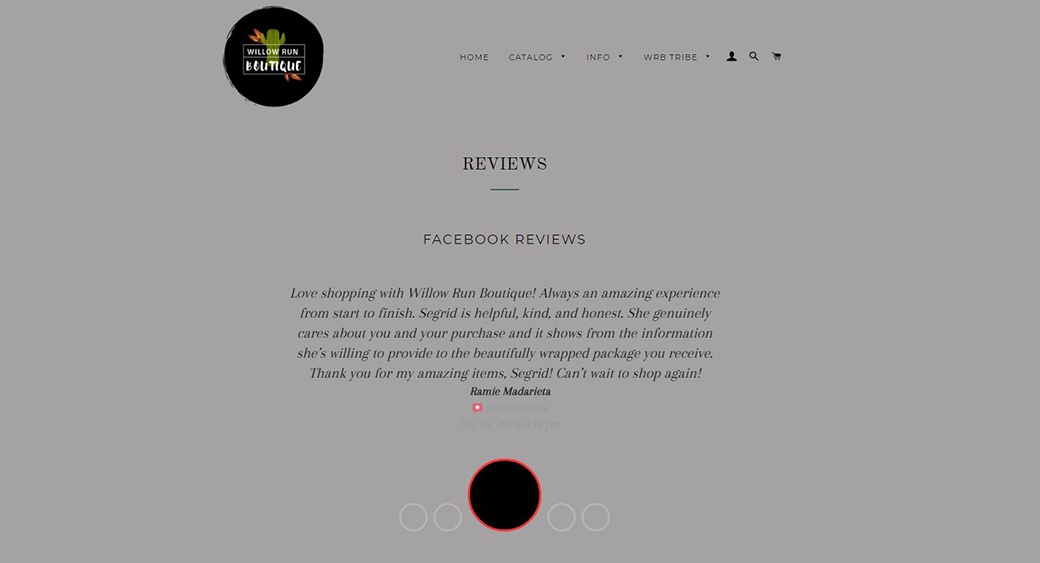4 Ways Facebook User Comments Can Benefit Your eCommerce Website
Both social media and eCommerce websites have enjoyed unprecedented increases in popularity over the last decade. The global eCommerce retail market has reached $3.53 trillion in revenues in 2018 and is projected to continue an unprecedented growth to attract at least $3 trillion more by the end of 2022. Things have been great for social media, too. Facebook, for example, has become the biggest social network in the world that enjoys more than 2.4 billion monthly active users. The boom shows no signs of stopping. Thus, Facebook user comments influence commercial websites greatly.

However, while eCommerce stores remain the most important place where people buy things, social media plays a massive role in encouraging them to make such decisions. For example, it provides customer reviews of businesses and the products/services they provide. It constitutes a big part of product research that online shoppers do these days. Thus, creating a website for selling products and connecting it to Facebook will be beneficial for businesses.
The role of social media in the customer’s journey towards the purchase as well as its ability to provide authentic reviews, are two significant factors that show the importance of integrating Facebook with eCommerce. In this guide, we will focus on how Facebook user comments can help increase sales if you integrate them properly.
Is Social Commerce Finally Becoming a Thing?
In the early days of social media, many people doubted its potential to cultivate relationships with customers and generate sales. Even though many brands have managed to gain significant followership on Facebook, most potential customers tend to spend time on the platform with other intents in mind.
Now, however, things are changing. Together with Instagram, Facebook emerged as the next generation of social media. Mainly, they provide a more visually- and customer-oriented experience for potential buyers. Thus, social commerce and social media marketing are starting to show signs of promise. Not only that, Facebook is already generating an impressive share of sales for brands.
The evidence comes from The Future of Retail 2019 report. Here, they discovered that 30 percent of Facebook users purchased a product from a business they found on the platform.

Social Commerce – Questions to Consider
Fueled by the power of Facebook influencers, reviews, and the desire for immediate gratification, social commerce has finally started to attract attention from brands. However, one important question remains, and brands need to address it.
Where the actual purchases will take place? Is it going to be on a Facebook product page or on an eCommerce store?
Like in many other situations, that’s where brands listen to their customers. As it turns out, the customers share a few significant concerns about buying products through social media. According to the above-mentioned The Future of Retail 2019 report, about 70 percent of U.S.-based online shoppers are worried about the security and privacy of such purchases.
Recent privacy issues that Facebook had to face throughout 2018 fuel these legitimate concerns. On top of that, people don’t like the idea of purchasing products directly on social media websites because of other issues. Among them, there is the fact that there’s no customer support to assist them with making a purchase.
Concerns about Social Commerce
Here’s the complete list of problems that customers report about the idea of buying through social media.

Clearly, eCommerce brands can’t ignore these concerns, especially given the fact that people are totally right about this. Who’s going to help with making purchases and resolving customer support requests to improve customer service if most brands are simply not ready for it?
However, another fact – that the volume of eCommerce visits provided by social media has increased by 110 percent over the past two years – stands. Thus, brands need to find a way to take advantage of this important channel to connect with more customers and increase sales.

Without a doubt, the power of social media lies in its extraordinary ability to provide customers with authentic testimonials from people who faced similar situations before them. And online reviews are huge in eCommerce now, with most online shoppers checking them out before making a purchase.
Besides, you should know that there’s an interesting psychological phenomenon at play when it comes to the influence of social media reviews on consumers. A recent study conducted by a group of researchers from the University of California suggested that people actually favor products that have more reviews over those that have fewer or none at all.
When researchers analyzed the data from Amazon, they were amazed to discover that most participants routinely selected a product with more reviews. In fact, the influence of online reviews was so strong that consumers favored more-reviewed products even when both proposed options had low ratings.
So, that does it: using social media reviews to increase eCommerce sales is a legit strategy that allows taking advantage of these tremendously important tools. It’s almost illegal not to use Facebook to advance your online business!
4 Ways of Improving eCommerce Websites with Facebook User Comments
In this section, we’re going to talk about the impact of Facebook user comments on your eCommerce store performance so you know how to start benefiting from this technique.

1. Facebook User Comments and Reviews Add Credibility
As we already know, customer reviews can be very impactful when it comes to convincing people to make a purchase. Even a small feed of authentic and detailed reviews from real customers can make a world of difference for many. So, you can improve the credibility of both your business and specific products by using it.
When customers have an option to read reviews from Facebook, many of them will take it. For example, a clothing and accessories store Willow Run Boutique displays Facebook reviews on a separate page on their website.

By doing so, they increase the possibility of more people being confident about purchasing their products. On the other hand, if a brand doesn’t provide any reviews, it has lower chances to earn customer’s assurance.
How You Can Be Better
There’s always some room for improvement. While the fact that Willow Run Boutique shows Facebook reviews on their website means that they’re off to the right start, you can be even better. Here’s how:
- Make the Reviews section more prominent by separating it from other menu items.
- Make sure that the text – the testimonial and the customer’s name – are easy to read by selecting an appropriate font color.
- Since the reviews come from Facebook, there’s a possibility to include a customer’s profile photo. Do that to draw more attention to the reviews.
Of course, implementing these points involves some programming work. However, remember that there are website builder templates to make this task easier. They allow a simple reconfiguration of elements thanks to drag-and-drop functionality. Consequently, you’ll get more freedom in terms of choosing a position for a section with Facebook reviews and making sure that it’s mobile-friendly. Additionally, such templates will help you avoid poor website design.
2. Facebook User Comments and Reviews Increase Product Page Engagement
Having Facebook user reviews on product pages is another critical factor for deciding whether a visitor converts. If a potential customer realizes that a number of people have benefitted from buying a product and were satisfied enough to leave a review, then their confidence to click on that Buy button will be boosted.
Besides, while reading the reviews, they can learn about the specific benefits of a product as well as the situations in which it helped others. For example, if you sell travel bags, then someone would be interested to find out how your products performed in specific situations.
Away, a company that’s really selling travel bags, has a section with reviews on each product page below the item’s description and gallery.

Having such a section with Facebook user reviews can greatly increase visitor engagement because many of them would want to read about the experiences of others. Not only this works great to keep potential customers longer on product pages and convince them to consider a purchase, but also improving a page’s SEO (dwell time – the time a visitor spends on a web page – is a ranking factor for Google).
How You Can Be Better
Away does a good job of increasing visitor engagement with a great review section. However, you can be even better if you implement the following.
- Change stars’ color to yellow to make them stand out and increase their ability to attract the attention of visitors
- Allow reviewers to indicate the most important things they loved about the product, for example, give them something like Advantages section with bulleted points. Such a section would make it easy to get the most useful information from a review quicker
- If you have a long list of reviews, ensure that the visitors can easily and quickly get back to the top of the page – that’s where that Add to Basket button is – with a “return to the top” button.
3. Replies to Facebook User Comments and Reviews Improve Your Image
You’ve seen it on Facebook: a customer writes a negative review about a business, and its representative responds by asking the details of their order and other ways they can help to get things right. Whether it’s a negative or a positive review, responding to them actually shows how serious a business is about helping customers and ensuring their satisfaction.

Besides, a reply also shows them what to expect when it comes to customer service, so many customers actually read the responses.
A Baymard Institute study on the importance of replying to reviews for eCommerce businesses supports that with these findings:
- 53 percent of online shoppers deliberately look for negative reviews for the products they’re interested in to find out how businesses handle negative situations
- 37 percent think that responding to a review is a great practice because it helps them with an overall evaluation of a product/service, website, and business.
- 87 percent of eCommerce businesses don’t respond to negative customer reviews.
On top of that, there’s evidence that 52 percent of online shoppers expect a response from online businesses within 7 days and 21 percent want a review response within 24 hours or less. Since so many businesses fail to do that, the field is wide open.
So, the main takeaway here is to write thoughtful, respectful, and relevant replies to customer reviews. Especially the negative ones, as it shows how your business handles issues that customers may face when buying from you. If you have limited experience with writing, keep in mind that there are online writing companies that can assist with producing templates for specific situations.
4. Facebook User Comments and Reviews Make Visitors More Comfortable and Confident about Buying
We know that customer reviews are at the core of eCommerce brand reputation building because they shape people’s perceptions. In addition to showing which products are worth buying, reviews also serve as social proof. Mainly, reviews determine how to think about a brand, a product, or a service. For example, a product has many positive Facebook reviews. Thus, the chances are that many customers will be much more comfortable and confident in buying it compared to a product that has no reviews.
This Pew Research Center survey of U.S-based online shoppers supports this. It showed that online reviews help consumers feel confident about their purchases; moreover, many of the respondents say that reviews make businesses “accountable to their customers.” The most interesting thing, however, was that online reviews were trusted more than government oversight.

In addition to providing that much-needed social proof, the respondents of the survey also thought that access to authentic consumer reviews also helps with “ensuring the safety of products and services.” Clearly, this shows once again how important it is for an eCommerce business to make reviews freely available for their potential customers. By the way, you can always check your success with social media metrics.
Pro Tip: Place a customer review on a checkout page to provide that much-needed motivation for a customer to complete the purchase.
Key Takeaways for You
Making Facebook reviews readily available on your website – whether in a special section or product pages – is an essential requirement for building brand reputation and shaping customer perception. One way to do this is to add a Facebook review widget.
A positive reputation and perception contribute to making customers more confident and comfortable with buying from your business.

Facebook User Comments – Summary
So, here you go, these are the ways Facebook user comments benefit eCommerce businesses. As you can see, with the proper knowledge and the right mindset, you can make them work for your business. Things like excellent customer service, great products, and well-designed websites help to sell. Still, adding reviews from Facebook will take your business one step further.
Hopefully, this article was helpful to you to know how to start improving your conversions. Happy selling!




Leave a Reply